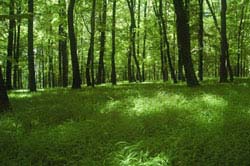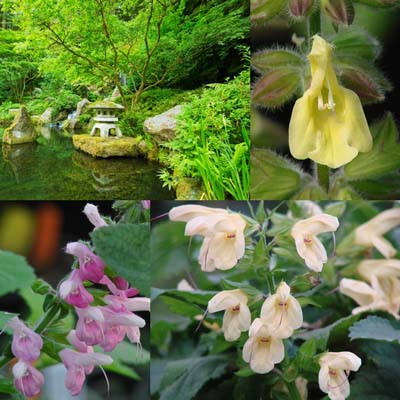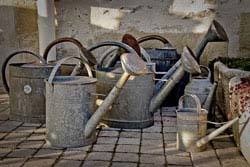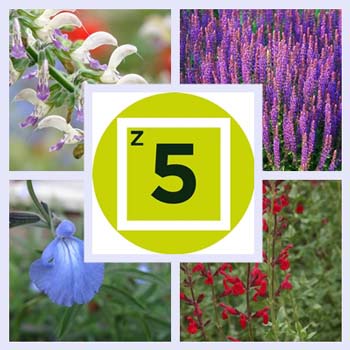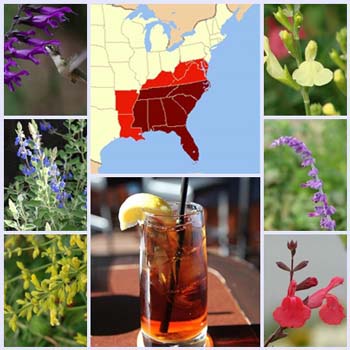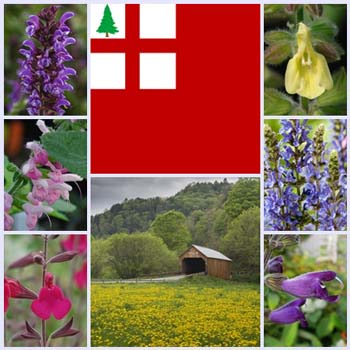Its short flower spikes rise up from basal clumps of shiny green, hairless, arrow-shaped leaves. Plants in this water-loving species can take a little morning sun, but do best with shade for the rest of the day. Pink Makino also needs rich, well-drained soil.
This is a plant that should be seen up close both for its extraordinary flowers and lush foliage. Plant it in a container, along a shady pathway or as a woodland groundcover. Although slow growing, this tough yet lovely sage is worth the wait. Fortunately, deer are unlikely to nibble it.
Send to friend
Posted: Wednesday, July 31, 2013
Synopsis:
Quick Digs is a serial containing short posts focused on a central issue about Salvia gardening. The topic for the first series is Salvia groundcovers for weed control, and this is the third article.
If you are a Salvia lover facing the difficult scenario of cold winters and damp soil, the sages listed here are right for winter conditions from USDA Zone 5 to 9. All are water-loving, shade-tolerant species and have handsome foliage that adds to landscaping even when the plants aren't blooming. By massing these plants, you gain coverage more rapidly and increase weed deterrence.
Read the Article
Posted: Friday, August 21, 2015
Synopsis:
Sturdy, shade-loving Japanese Salvias are lovely additions to woodland gardens with their lush, large-leafed foliage and delicate-looking flowers in colors including pinks, purples and yellows. They're ideal for bordering shady paths where they invite visitors to pause for close-up views. Flowers by the Sea suggests Japanese species for woodland gardens and organizes them according to their cold hardiness.
Read the Article
Posted: Friday, February 20, 2015
Synopsis:
Salvias may need little or lots of water depending on species and local growing conditions. Many are drought resistant, getting by on less than an inch a week. Learn about the many kinds of Salvias, also called sages, at Flowers by the Sea. We're an online, mail-order nursery specializing in sages.
Read the Article
Posted: Saturday, February 28, 2015
Synopsis:
To bloom yearly, Salvia perennials and shrubs in USDA Hardiness Zone 5 need to tolerate deep freeze winters with average low temperatures of -20 degrees F. The success of Zone 5 sages also depends on local growing conditions. Learn more at Flowers by the Sea, an online, mail-order Salvia nursery.
Read the Article
Posted: Saturday, May 2, 2015
Synopsis:
True sages are members of the Salvia genus and number in the hundreds. They are native to a wide variety of environments worldwide, which is why some are ideal for the dry gardens of California and others can handle the abundant moisture of the American Southeast. Flowers by the Sea raises many sages that grow well in the Southeast, including some that are either native to the region or have jumped fences from gardens into the wild.
Read the Article
Posted: Thursday, April 30, 2015
Synopsis:
Some people think you only find sage and coyotes out West. But Canis latrans, the Eastern Coyote, slipped into New England in the 1930s, and who knows when all the sages arrived? The New England Wild Flower Society notes that Lyreleaf Sage (Salvia lyrata) is the region's only native sage. It's one among many Salvia species grown in the Botanic Garden of Smith College in Massachusetts, which has one of the largest collections of sage in the region. Flowers by the Sea Online Plant Nursery raises hundreds of sages, including many northeastern favorites.
Read the Article
Colors
RHS# 62D
RHS# 57D
RHS# 143C
RHS# 143C
Learn more about how we analyze plant colors
We based our analysis of this plant’s floral and foliar color on the internationally standardized color system published by the U.K.’s Royal Horticultural Society. Called the RHS Large Colour Charts, this publication is a boxed set of color swatches arranged in fans and containing all the colors that RHS has identified in horticulture. RHS gives each color a common name and code number.
Each swatch has a small hole punched into it. We place the swatch over a flower petal and compare the blossom’s color to that of the card. When using RHS colors to compare plants that you want to combine in a flowerbed, in bouquets or in some other manner, RHS says to view them indoors in north light. If you are matching our digital swatches to flowers already in your garden, pluck two or three fully open blossoms of each plant that requires analysis.
You may find that the plant you receive from FBTS varies somewhat in color from what appears in our color analysis or our photograph due to a number of factors, including:
- Variations in photographic colors based on lighting level at different times of day
- Differences in the resolution of digital screens
- Seasonal changes in plant color due to changes in temperature and plant cycle and
- pH or soil chemistry that varies from one locale to another and causes color shifts.
Finally, RHS notes that you shouldn’t attempt color matching when your eyes are fatigued.
Here are some guidelines for success with this plant in your garden.
Click on an individual icon for more detailed information.
Exposure
This plant can handle extreme heat.
Full-sun Salvias that don’t like any shade are among the most heat tolerant. Heat-loving Salvias also are often drought tolerant. Moisture-conserving features, such as fuzzy leaves, help them stay perky at high temperatures.
Heat-tolerant Salvias are fine choices for western and southern exposures.
This plant thrives when planted where it will receive morning sun followed by afternoon shade, such as on the eastern side of a house. Make sure it isn’t exposed to midday and afternoon sun, which can damage tender leaves during the summer when sunlight is more intense due to being more direct.
Although midday is when sunlight is most direct, it takes time for the atmosphere to heat up and for heat to peak at sometime in the afternoon. Salvias that prefer cooler temperatures are protected by afternoon shade during the hottest time of year.
This plant grows well in partial shade, such as the kind on the edge of woodlands or under deciduous trees with breaks in the foliage through which dappled sunlight penetrates. Many Salvias thrive in partial shade, including ones that spend part of their day in full sunlight. Some species need partial shade to overcome severe heat and dry soil.
Garden Uses
This plant grows well in an outdoor container, such as on a patio.
Some containerized Salvias leaf out and flower year after year following a period of dormancy. Annuals in containers may die back and appear to grow again when they reseed.
During extreme heat, check the soil in container plantings once or twice daily to be sure it doesn't completely dry out. Feel its surface for coolness, then gently poke a finger into the soil to check for dryness.
Growing Habit
Plant hardiness Zones defined by the U.S. Department of Agriculture tell you the minimum temperatures a plant can withstand in your garden. The USDA divides the nation into winter climate areas from coldest (Zone 1) to warmest (Zone 11).
However, it is sometimes possible to grow a Zone 6 Salvia as a perennial in Zone 5 if you provide preferential care, such as winter mulching and a location sheltered from harsh winds. In contrast, a Zone 9 Salvia may act like a perennial in Zone 10 if given a bit of shade or extra water.
To create a harmonious landscape plan, it is important to consider the heights of individual plants.
Height also affects function. Short Salvias often make excellent ground covers that conserve soil moisture and discourage weeds while also brightening your yard. Medium-height Salvias, such as ones 36 inches tall, often are ideal border plants. A tall Salvia planted singly can highlight a landscape; multiple plantings can form an attractive screen.
By considering the width of a plant, you can determine how many to place in a row or what other plants to grow with it.
For example, a narrow, moderate-height Salvia may look good interplanted with bushier species, kind of like Mutt and Jeff.
In contrast, wide-spreading Salvias are economical for hiding lengths of wall and fence or for creating hedge-like divisions in a yard.
Plant this herbaceous species in the USDA Zones where it grows as a perennial, returning year after year.
After dying back to the ground at frost, herbaceous perennials emerge in the Spring with soft, new growth. A Salvia that is perennial in one region, may be an annual in another depending on local conditions, such as winter temperatures.
If you live in USDA Zone 5, for example, Salvias in our catalog cited as growing well in Zone 5 or lower will be perennial. Those cited as doing well in Zones 6 or higher may do well in Zone 5, but generally will act like annuals coming back from seed instead of the parent plant’s roots.
Water Needs
This plant thrives on or at least tolerates lots of water, especially when soil is well drained. They are generally not suitable for poorly drained soils.
A number of Salvias hold up well in areas where rainfall is a regular occurrence. Some even tolerate boggy conditions but only for a brief time. These are usually top-notch plants for regions of the country, such as the Southeast, where summers are soggy.
Blooming Season
This plant reaches peak bloom in Fall or flowers for much of the season.
It may begin flowering much earlier in the year. Bloom time for some Salvias lasts from Spring till first frost. Others begin flowering in Summer and continue into Fall. There are also Salvias that don’t bloom until late Fall and continue into Winter if grown in mild-Winter areas.
There is a great deal of overlap in blooming seasons for Salvias.
Wildlife
Unless local forage is in short supply, most deer likely will avoid this plant.
It appears that deer dislike Salvias, in general, due to their volatile oils that make the plants so fragrant and savory in cooking. However, the only completely deer-proof plants are the ones grown beyond reach.

